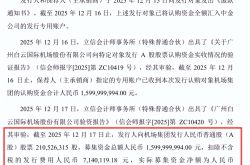Chengdu's Large-scale Demolition and Industry's "Westward March"? Sorting Out the Truth
![]() 10/21 2024
10/21 2024
![]() 691
691
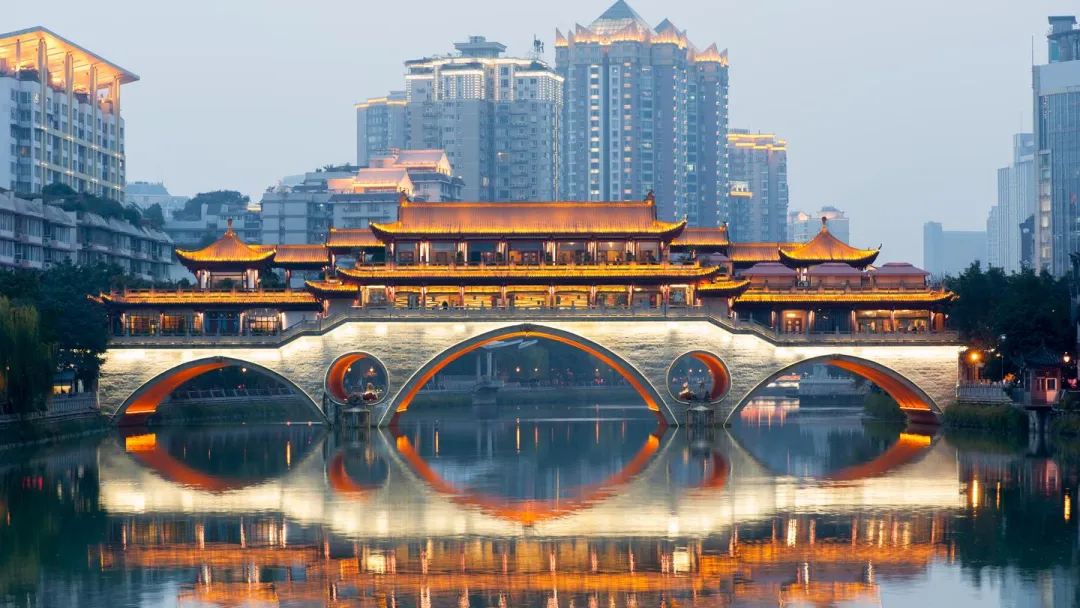
A few days ago, Chengdu made headlines as internet users across the country showed off their demolition payments, with tales of overnight riches. The origin of this buzz was an image circulating online depicting multiple demolition sites in Chengdu, with some netizens claiming to have received compensation exceeding ten million yuan, leading to instant wealth. The topic "Chengdu Demolition Map Updated" also dominated Weibo's trending topics.
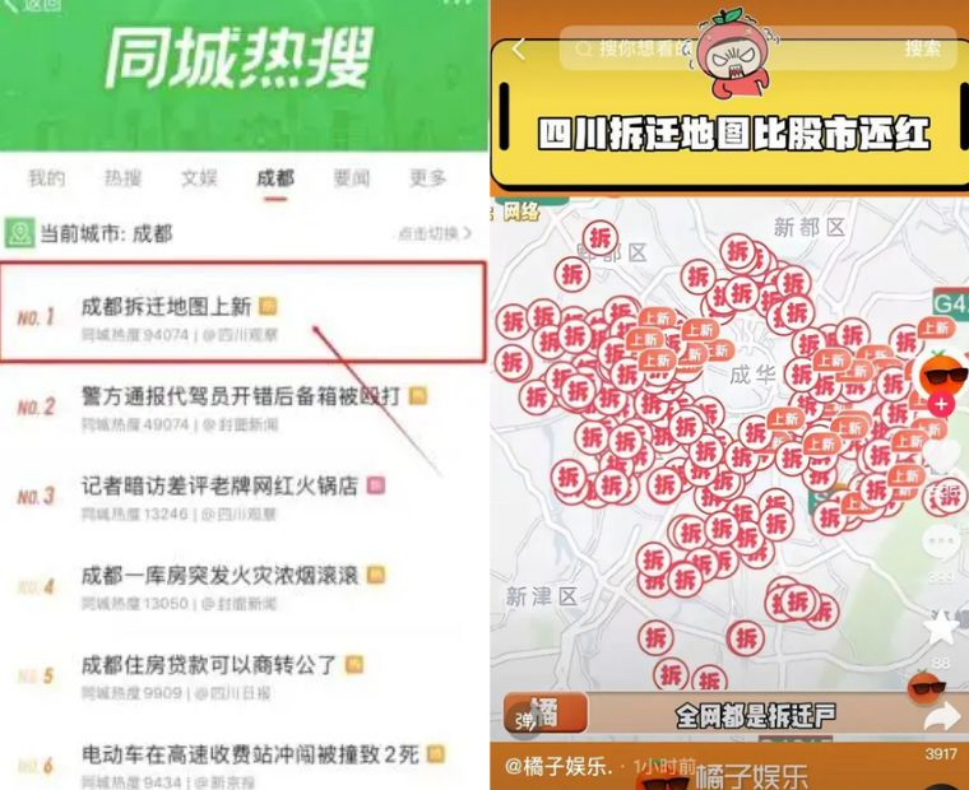
Weibo Screenshot: Chengdu Demolition Map
Some netizens even linked Chengdu's large-scale demolition to topics such as "Western Development" and "Strategic Planning for Western Hinterland." On October 16, public sentiment even sparked multiple stock suspensions in the Chengdu-Chongqing sector on the A-share market.
However, the reality check came swiftly, with various official channels debunking rumors and the police issuing a statement on October 17.
According to the announcement from Chengdu Public Security Bureau, information circulating online about "Sichuan launching a 2.15 trillion yuan demolition project" and "Chengdu's large-scale demolition leading to overnight millionaires" sparked heated discussions and disrupted public order. Relevant departments in Chengdu have debunked these rumors and imposed administrative penalties on four individuals.
Is Chengdu truly undergoing large-scale demolitions and construction of new industries? Are the rumors of Sichuan investing 2.15 trillion yuan in construction and industrial transfer groundless? Today, let's sort through the key information.
No Overnight Millionaires: Demolition Compensation Within 200,000 Yuan Per Person
Does Chengdu really have sky-high demolition compensation? A reporter interviewed residents of the Gubai Community in Shaheyuan Street, Jinniu District, which was marked on the Chengdu Demolition Map. In September 2023, multiple plots of land in this community were expropriated from collective construction land to become state-owned.
After conducting on-site interviews, the reporter found that according to the compensation standards set by the government (590 yuan per square meter for housing), most residents who agreed to the demolition received compensation of around one hundred thousand yuan. There were no instances of multi-million yuan payouts or multiple houses as rumored online.

Tai Koo Li, Chengdu (Source: The Cover News)
Regarding the rumors, the Chengdu Municipal Planning and Natural Resources Bureau responded that all compensation standards for land expropriation and demolition are publicly available on their official website. "It is impossible for one person or household to receive tens of millions of yuan in compensation," they clarified.
Chengdu Fangxiaotuan, the source of the so-called "Chengdu Demolition Map," also issued a clarification stating that the demolition projects mentioned in the map were based on publicly available market data, which were gradually released over a period of one year or longer, rather than all at once recently.
A local real estate developer in Chengdu commented that plans for demolitions have always existed in Chengdu, but they are now being packaged and discussed collectively. Most of the affected buildings are decades-old or old farmers' markets, making high compensation unlikely.
Most local real estate developers in Chengdu also responded that rumors of large-scale demolitions in the city are inherently unreasonable. Chengdu has specific policies and compensation standards for land expropriation and demolition, which are publicly available on the official website. Compensation is determined through comprehensive assessments based on factors such as the scale and location of the demolition. The idea of becoming an overnight millionaire through demolitions does not exist anymore. In recent years, large cities have strict procedures and standards for demolitions, making it impossible for a city's demolition plan to suddenly explode or experience explosive growth overnight.
According to multiple media reports, Chengdu introduced a housing voucher system for its demolition projects several years ago, further reducing the likelihood of overnight wealth creation myths. On August 15, 2023, the Chengdu Housing and Urban-Rural Development Bureau announced the launch of a citywide "trade-in" program for housing, encouraging district and county governments to adopt diversified approaches to resettlement and promoting the "trade-in" program through housing vouchers.
Industrial Transfer or Employment Enhancement?
Some speculate that the rumors about Chengdu's large-scale demolitions may have originated from the real estate sector, given the current downturn in the industry and developers' desperation to sell properties. However, the rumors about "industrial transfer" in Chengdu's demolition rumors are not entirely baseless.
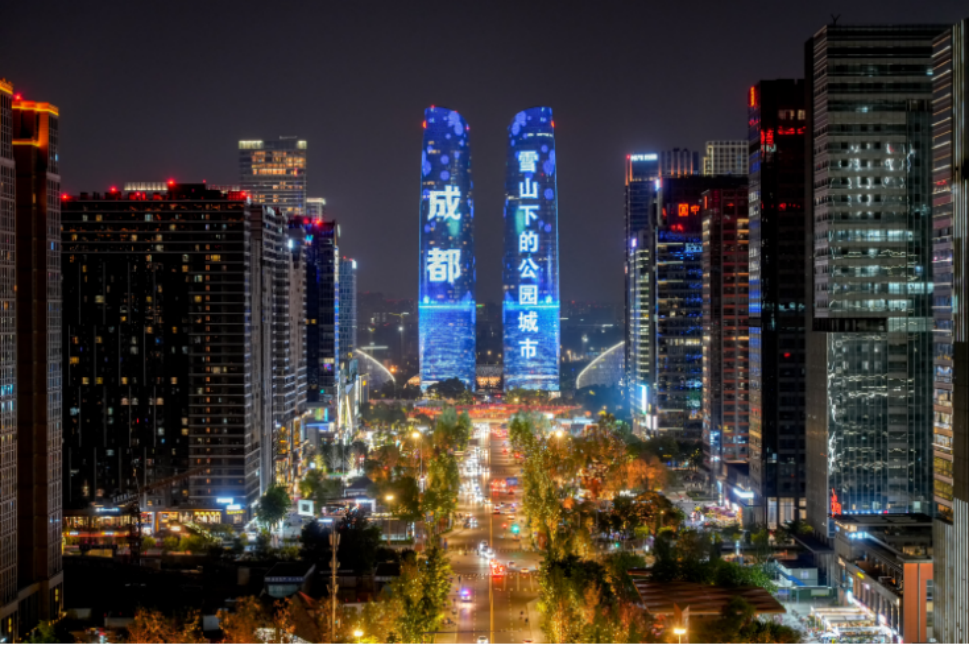
Chengdu Night View (Source: The Cover News)
The rumors stemmed from an official document released on September 25, titled "Opinions on Implementing an Employment Priority Strategy to Promote High-Quality and Full Employment." The document explicitly proposed guiding the orderly transfer of capital, technology, and labor-intensive industries.
However, it is crucial to read and interpret this document carefully. Firstly, the document is not solely focused on Sichuan but aims to facilitate the transfer of industries from eastern and central China to the western regions, as well as from central cities to their hinterlands. This encompasses a broader strategy involving provinces and municipalities such as Hunan, Chongqing, Yunnan, and Guizhou, suggesting a grand plan for the entire western region.
Secondly, why did the state make such a statement? Why did it suddenly mention industrial transfer?
The answer is clearly stated in the news. The first sentence explicitly calls for implementing an employment priority strategy. Behind the industrial transfer lies the state's consideration of employment issues in non-central cities, rather than simple demolition and resettlement or rapid progress.
In fact, if you live in any province in the western region, finding a suitable job after graduation can be challenging due to limited educational resources. Throughout the west, young labor tends to migrate to the Pearl River Delta, Yangtze River Delta, or other developed regions, leaving western provinces struggling to retain their workforce. Therefore, regional centers like Chengdu have a development mission to guide young people who cannot find suitable local employment to neighboring central cities.
In reality, since 2010, the central government has proposed that the central and western regions undertake the task of industrial transfer. Thus, this large-scale transfer is not a simple copy-paste exercise but requires targeted industrial layout based on the actual conditions of the central and western regions.
According to the document, 330 major projects with a total investment exceeding two trillion yuan will be implemented in Sichuan. Currently, more than a dozen manufacturing giants, including Gree and Hisense, are already involved. Coupled with Sichuan-Chongqing's abundant resources, this wave of investment in Chengdu and Sichuan is expected to significantly benefit upstream and downstream industries, including infrastructure projects.
In fact, Chengdu has already established four industrial clusters with a value exceeding 100 billion yuan in electronics, biopharmaceuticals, digital economy, and aerospace. It is projected that the scale of Chengdu's AI and robotics industry will exceed 100 billion yuan in 2024, ranking first in the west and seventh nationwide.
Regarding rumors that companies such as TCL and Gree Electric Appliances would relocate from Guangdong to Sichuan, media outlets have confirmed them to be unfounded.
Not Just a Viral Sensation, But Also the Fourth Economic Pole
In the eyes of netizens, Chengdu is a viral sensation with Tai Koo Li, Panda Tower, streets filled with beautiful people, and various leisure cultures. Overall, it feels more like a tourist city centered on culture and tourism. However, with its strength, Chengdu is not only capable of serving as an industrial transfer center but also has the potential to become China's fourth economic pole. In 2023, Chengdu's GDP reached 2.2 trillion yuan, surpassing Hangzhou to become the seventh-largest city in China's economy.
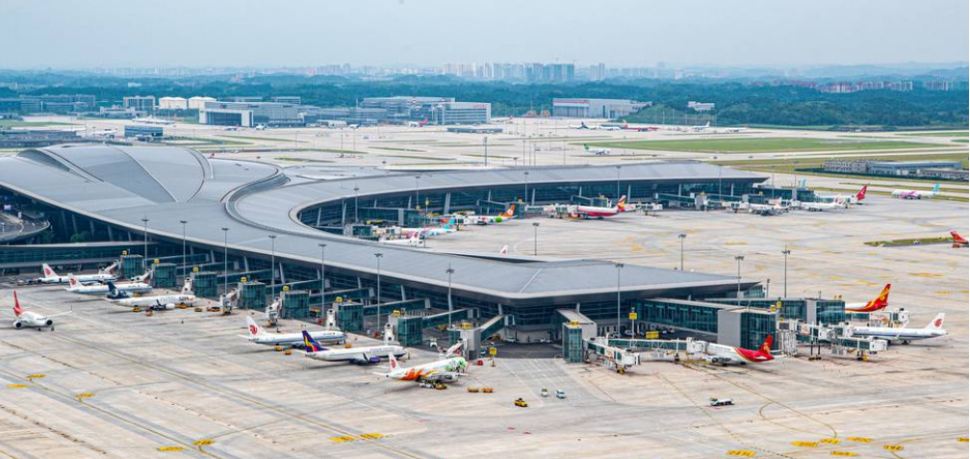
Tianfu International Airport
The completion of Tianfu International Airport made Chengdu the third busiest airport in China in terms of passenger throughput in 2023, with 74.92 million passengers, trailing only Shanghai and Beijing. Chengdu also operates three regular China-Europe freight trains, enabling direct exports to Europe and Russia.
Another indicator of Chengdu's rise is its population. By the end of 2023, Chengdu's permanent resident population reached 21.403 million, ranking fourth among Chinese cities and closing in on Beijing. From 2010 to 2023, Chengdu's permanent resident population increased by 7.35 million.
Chengdu's role in China's economy has transcended its southwestern location, embracing a national perspective.
In August 2003, Intel announced the establishment of a semiconductor chip packaging and testing factory in Chengdu Hi-Tech West Zone. Today, half of Intel's mobile device microprocessors worldwide are produced in Chengdu. This landmark investment planted the seeds of high-tech industries in southwestern Chengdu.
Chengdu also boasts a significant geographical advantage. Land is crucial for urban development, and Chengdu, being a plain, has an edge. Currently, China's policy separates urban construction land from agricultural land, prohibiting direct conversion of rural land for housing construction. So, how does Chengdu increase its land use indicators for development? By swapping land. In recent years, Chengdu and the Sichuan Provincial Government have submitted reports to the central government to swap rural land for urban land. As the capital of Sichuan and with the province's vast territory, Chengdu has ample room for land expansion.
In recent years, tech giants like Tencent, Alibaba, Xiaomi, and Huawei have all established branches in Chengdu, attracted by the city's large population and excellent infrastructure.
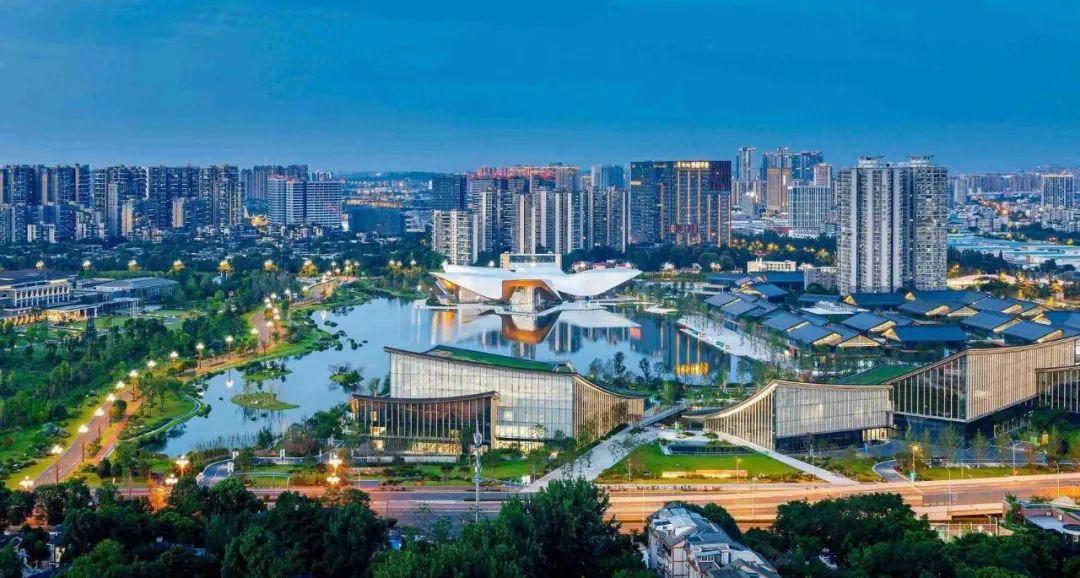
Source: Sichuan Online
However, compared to central and eastern cities, Chengdu's leading companies pale in comparison to the household names in Beijing, Shanghai, Guangzhou, and Shenzhen. The top-ranked company, New Hope Group, is primarily engaged in agriculture and animal husbandry. As a typical inland city, Chengdu has a relatively weak industrial base with lower-quality local brands.
Although Chengdu's large-scale demolition rumors have been proven false, as the Land of Abundance, Chengdu remains a unique resource treasure trove in the west. As a new first-tier city with immense economic potential, Chengdu can do more than just serve as an industrial transfer base; it can also become a livable metropolis.
References
1. "Did Someone in Chengdu Receive 17 Apartments from Demolition Compensation? Multiple Demolition Households Say It's Unreliable," Upstream Investigation
2. "Chengdu Demolition Compensation Within 200,000 Yuan Per Person, Resettlement Houses Far Away in the Suburbs," Jiu Pai News
3. "Chengdu Enters Its 'Adolescence'"





